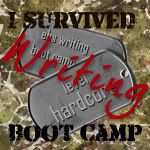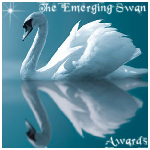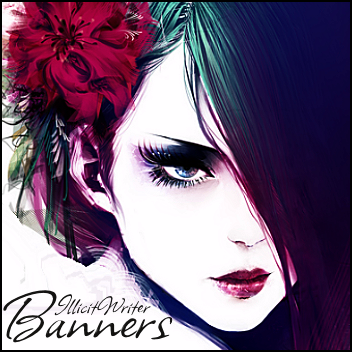Once upon a time, there was a man who claimed to have three souls.
He was a writer and he used these word to explain his condition: "tria corda". It's Latin, because Ennius -- this is his name -- lived between 239 and 169 b.C.
His statement about his souls, or about his "hearts", if we translate literally his latin expression, has nothing to do with religion. Ennius was referring to the languages he knew and used. They were Oscan (his mothertongue), Greek, that was the "international" language in the Mediterranean area, and Latin, that was the language of his masters.
Yes, masters, because Ennius arrived in Rome as a slave. He was one of the first and most important authors of a literature that was written in his third language.
In the Twilight fandom, I've read the stories of many authors who write in English but aren't native speakers.
They have different methods -- someone writes immediately in English, someone translates from his/her native language -- and I was surprised to know that someone finds difficult to say the same things he/she'd created in English in his/her own language!
Do you consider languages as bridges or as gaps?
What is your experience about writing in a foreign language?



























Writing in a foreign language it's hard and challenging. Some concepts and ideas that you may need a word in one language, sometimes need an entire phrase in another language. As you know. I write in English, but my mother language is Portuguese. Now, I' translating what I wrote in English to Portuguese, and it's hard!
ReplyDeleteI have written in English for years, but never stories. Working for an environmental organization that was part of an international network, I wrote reports, press releases and a lot of letters. I learned very soon that translating from Italian into English was extremely difficult, as the two languages could not be more different in structure (and sometimes in concepts, as each language reflects the history and culture of a people). So I started writing directly in English, if I could. When my boss wanted me to write a letter for her, I told her not to write it and give it to me, but to sit with me and tell me what she wanted to say. I would then put the concepts in English and then tell her in Italian what I had written. It worked (She was a very nice boss).
ReplyDeleteWhen I got twilighted (hard) and discovered fan fiction I was enraptured and, after a few weeks, I too wanted to contribute (The only way I could own Edward for a while and make him do what I wanted !), so I started writing.
To be honest, my first story (Food for the gods) was rejected by Twilighted net. There were conceptual and punctuation mistakes (believe it or not, punctuation is different in the two languages). I persevered, amended it and eventually it was accepted. Then I learned the existence of Betas, got a few different ones till I found the wonderful HobbitIvy – not a comma escapes her. Pre readers followed, first Serendipitous and now also Raum. All in all I have written 15 stories for Twilight.
Thank you so much Camilla and many congrats on your gorgeous stories!!
ReplyDeleteThank you HopeReborn and congrats on your work!
ReplyDeleteGood luck for everything!!!
First of all, I'd like to say this was a lovely post - I always enjoy what you have to say.
ReplyDeleteI've recently come across a few gaps in my translation from my native tongue to English, which my beta pointed out to me. It was a common phrase that I wrote in English, and she had absolutely no idea what I meant about it.
But no, there's rarely I time where I translate directly to English, although sometimes I get stuck on a few words, I write IN English. But it's funny, when you say it; I often have problems translating FROM English to Norwegian.. Hee Hee.
And like Camilla stated before me, there is a difference in punctuation from language to language. When I started writing fanfiction, I had mayor problems with it - and the writing too. It's been almost three years, and I feel like I've really evolved as a writer - and I sense my stories have reached a deeper ground now that my English has improved.
xx
JJ
Hi Jay!
ReplyDeleteThank you very much for joining the discussion and for sharing your experience!
About punctuation, I've noticed that some things that are correct in English would be considered a mistake in Italian, so sometimes it can be tricky!
Another field where I find difficulties is represented by jokes or idiomatic expressions.
Jokes, ugh - all my best ones are hilarious; one involving a horse, a farmer, a man, and "lengts", but the second I tried to tell it in English, it all went to hell.
ReplyDeleteIt's rarely a time when you can use the same expression in English when translated from your native tongue. Sometimes it bothers me to death, but then again, what can I do?
Now why have I not been participating in this thread before? RL takes too much time away from my fanfiction needs :-)
ReplyDeleteAnyone who knows me, knows that I have (strong) opinions about most things... and so also about this question. I write directly in English. Or Italian. Or Swedish, my native language. And there is no way in the world that I can express the same thing in the three languages - the concepts just do not translate. Three souls, indeed.
My husband (Italian) says I seem like a different person when I talk to my mother (in Sweden) - my Swedish persona is laid back and cool (his words, my friends, bless his heart); when I speak with my father (in Ottawa) or my brother (in Toronto) I seem like another person again, more scholarly, precise. Needless to say, in Italian, as I decided to speak as the people spoke around me, and having mostly men for friends the first years, that turned my Italian usage into a rougher one than is usual for a woman. That is a good thing. It keeps people on their toes, not sure about who I am. It is not easy to put me into a box with a simple etiquette of "foreign", "woman", or "normal". I kind of require all of them.
You are who and what you can express. In Italian I have nuances of words and colors that are non-existent in Swedish. Just think of all the shades of blue... In Swedish, I have to qualify with words like steel, sky, thunder, etc to get to the same nuance... but... but... When I say "Blue" in English. Or "Bleue" in French. Or "Blu" in Italian. Or "Blå" in Swedish. IT IS NOT THE SAME COLOR. Even in my head, I see a different shade when I change language. And no matter how fluent I may be in any language, what comes out in translations, is a transformation. A bastardization. If it's a good one, it can actually be a pleasure. But most of the times it is just a way of taking away from the experience.
I am a translator since 19 years, so I am part of that process. But I only do technical translations, because I feel I can't do a story justice. So far, I have only found one (1!) translator who can do what I want done. (She translated Winnie-the-Pooh into Swedish.)
Not even my own stories are translated, by me or anyone else. Because when I try, they sound fake, wrong, different, and do not send out the message I was aiming for in the original.
So I do tractor manuals, people. Can't go wrong with the bolts.
Camilla! Your stories are fab! You have them up in both English and Italian. But I really prefer them in English. They were born in English, and when I read them in your (very fine) Italian, something disappears, vanishes, falls through the cracks... Something is missing.
I think it is the soul of the story. It lives in a specific language.
Bella and Edward are alive in English. When I read fanfics in Swedish I laugh. It feels so wrong - just like reading SM's books in Swedish felt wrong.
As I said, I have very strong opinions on the connection between language, usage and life. That's why I have spent most of my adult life trying to master the way other people express themselves. In five languages, not all of them up to par, yet.
And in the end, THIS is why we are right now able to communicate with each other! If we were all stuck in our original languages, we would not be here today, conversing.
Because, let's face it, Swedish is a bit like Oscan. There are not a whole lot of people out there to talk to when you're stuck in that language.
Dear Anna!
ReplyDeletethank you very much for joining the discussion and for sharing your extraordinary experience!
- Raum